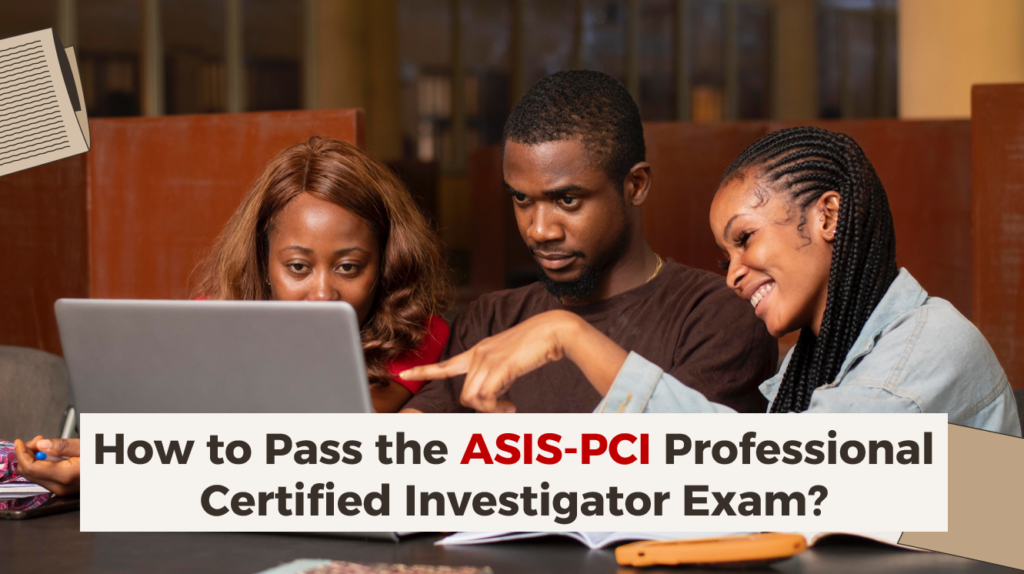How to Pass the ASIS-PCI Professional Certified Investigator Exam?
The Professional Certified Investigator (PCI) certification validates your expertise in investigative techniques, case management, and presenting findings. Earning this credential can significantly enhance your career prospects, give you a competitive edge in the marketplace, and offer global recognition for your investigative abilities. However, like any certification, passing the PCI exam requires thorough preparation, strategy, and dedication.

What Is the ASIS-PCI Certification?
The ASIS-PCI certification is designed for professionals with three to five years of investigative experience, including at least two years in case management. This certification demonstrates your proficiency in conducting and managing investigations, ensuring you possess the necessary skills to tackle complex security challenges. With a PCI designation, you demonstrate a mastery of investigative practices, which can lead to enhanced career prospects and earning potential.
PCI Exam Overview
The PCI exam consists of 125 scored multiple-choice questions and 15 unscored questions, all of which must be completed within 2.5 hours. It covers three primary domains:
1. Case Management (30%)
2. Investigative Techniques and Procedures (50%)
3. Case Presentation (20%)
The ASIS-PCI exam evaluates your ability to plan, conduct, and manage investigations effectively, ensuring that your work adheres to legal and ethical standards.
Step-by-Step Guide to Passing ASIS-PCI Exam
1. Assess Your Eligibility
Before diving into exam preparation, ensure you meet the PCI eligibility requirements. You need at least three to five years of professional investigative experience, including two years in case management. Make sure to document your experience to qualify for the exam.
2. Understand the Exam Content Outline
The PCI exam blueprint outlines the key domains and the percentage of questions dedicated to each. Study the content areas thoroughly:
– Case Management: Involves organizing and conducting investigations, managing investigative resources, and ensuring adherence to policies.
– Investigative Techniques: Includes methods for collecting information, evidence handling, interviewing techniques, and surveillance.
– Case Presentation: Focuses on presenting investigation results, report writing, and testifying in legal proceedings.
Understanding the weighting of each section helps you prioritize your study efforts. Since Investigative Techniques make up half of the exam, this area should receive a significant portion of your preparation time.
3. Take an ASIS PCI Study Course
ASIS International offers official PCI review courses that provide an excellent structured approach to exam preparation. These courses can be taken in person or online and cover key concepts, practice questions, and tips from experienced investigators who have earned the credential.
4. Practice with Sample Questions
One of the best ways to prepare for the PCI exam is by practicing ASIS-PCI sample questions. These can help you become familiar with the format of the exam, improve your time management, and identify areas where you need to focus your study. Be sure to review the correct answers and explanations to understand why certain answers are correct.
5. Join a Study Group
Study groups are a valuable resource for bouncing ideas, sharing study materials, and clarifying difficult concepts. You can join ASIS study groups or create one with colleagues who are also pursuing the PCI certification. Engaging with peers provides fresh perspectives and can help deepen your understanding of the subject matter.
6. Stay Updated on Investigative Techniques
Investigative techniques evolve with technology and legal frameworks. Stay informed about current best practices in interviewing, evidence gathering, surveillance, and digital investigations. This section is heavily weighted, making up 50% of the exam, so it’s essential to stay well-versed in practical investigative methods.
Earning the ASIS-PCI certification is a significant career milestone for professional investigators, demonstrating a high level of competence in investigative techniques, case management, and case presentation. By following these steps, utilizing the recommended materials, and committing to thorough preparation, you can confidently approach the PCI exam and enhance both your career and your standing in the security industry.
